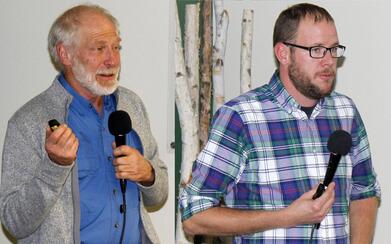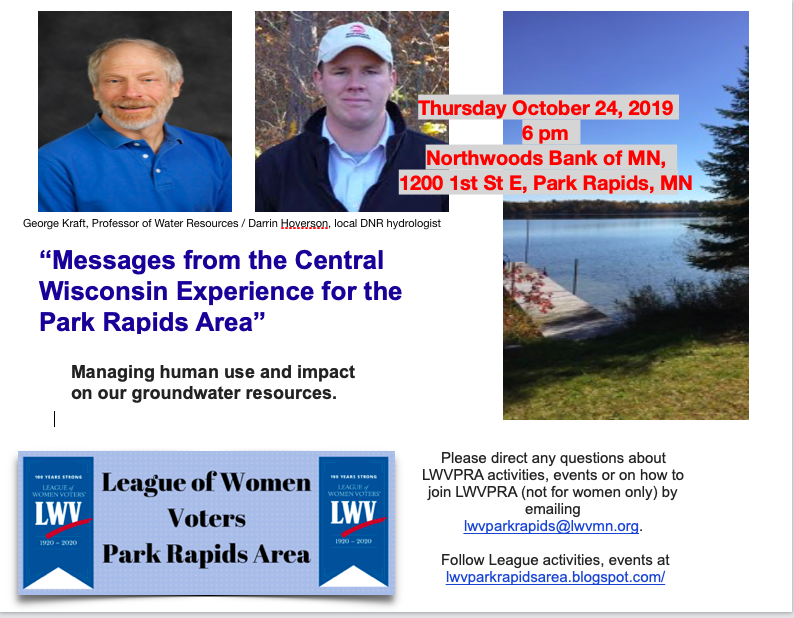Program at LWV Park Rapids (MN), October 24, 2019 The League of Women Voters Park Rapids Area tackled ground water sustainability concerns in their October 24 meeting. Ground water sustainability is a critical issue to people in the Park Rapids area. The City of Park Rapids has had to deal with excess nitrates in one city well. Many rural residents need to buy bottled water for drinking and cooking because of nitrate concerns. Is this the “tip of the iceberg” or are there ways to manage our groundwater that will allow for industry, agriculture and citizens to share this valuable resource? (photo - Park Rapids Enterprise) Two speakers were on hand for this meeting. The first speaker was Dr. George Kraft, a hydrologist and Professor Emeritus of Water Resources at the University of Wisconsin, Stevens Point. In his thirty years at UW Stevens Point, Dr. Kraft has performed research, advised on policy and doing Extension education on groundwater sustainability issues. His work has concentrated on nitrate pollution of groundwater and drinking water, and how groundwater irrigation pumping has caused a decline in streamflows and lake levels in central Wisconsin. He has published extensively on groundwater concerns, and is sought after as an advisor on scientific and policy workgroups. Dr. Kraft spoke at an LWV UMRR meeting in Stevens Point in April of 2018.
Dr. Kraft’s Park Rapids presentation reflected on his 30 year record of research on how irrigated farming, mainly for potato, other vegetables and field corn have affected groundwater quality and quantity in central Wisconsin. In central Wisconsin, the main issues are extensive nitrate pollution, as over 40 percent of wells in some townships exceed standards, and drying of lakes and streams by unlimited irrigation. This sounds familiar to folks in the Park Rapids area. Dr. Kraft discussed how politics and a strong industry lobby have stymied even discussing the causes and effects of water challenges, let alone suggesting policies on how to manage them. Though Park Rapids area industry, geography, geology and politics may differ from those that exist in central Wisconsin, that region’s experiences may be a help in advancing more proactive discussion and avoiding pitfalls. The second speaker was Minnesota Department of Natural Resources (DNR) Area Hydrologist Darrin Hoverson. Darrin’s responsibilities include surface and groundwater resource management, water resource compliance and regulation as well as providing technical analysis, assistance and information to the public, local and state units of government and other water resource professionals. Having grown up in the Park Rapids area, being an active member of this community and with his 12 years of work at the DNR, Hoverson provides a deep understanding of the area’s natural resources, the community and local issues and concerns. His education includes a Master’s in Water Resources from the University of Wisconsin, Stevens Point, and a Bachelor’s degree in Aquatic Biology from St. Cloud State University. In his candid and thorough presentation, Hoverson provided a brief history and update on DNR groundwater management efforts within the Pineland Sands & Straight River Groundwater Management Areas, ongoing and future monitoring and groundwater studies and private/public partnerships. He focused on DNR’s roles and authority in ensuring the sustainable use of the region’s groundwater and groundwater dependent resources. The session was recorded, and is available on You Tube here. There was lively discussion following the presentations, which is included with the video here.
0 Comments
Leave a Reply. |
| LWV Upper Mississippi River Region | UMRR blog |

 RSS Feed
RSS Feed